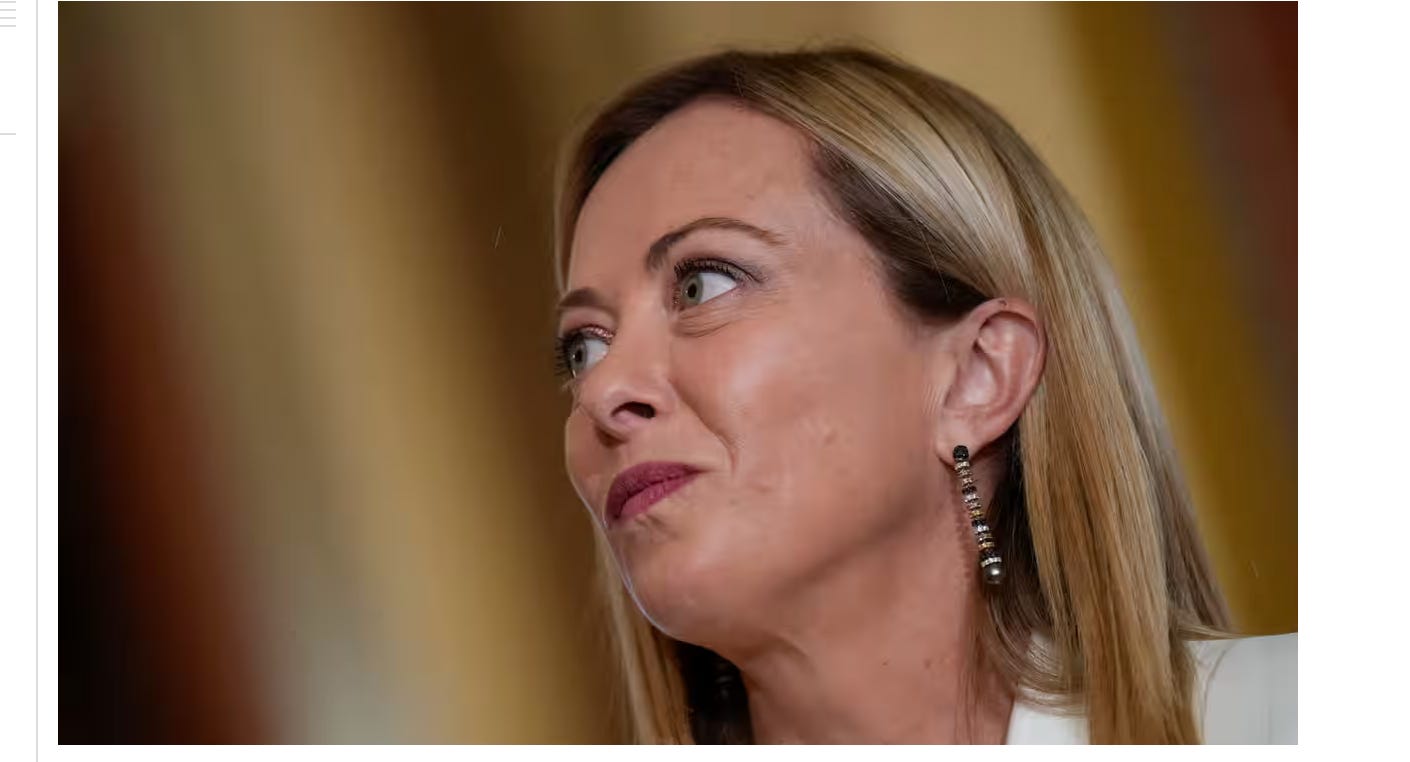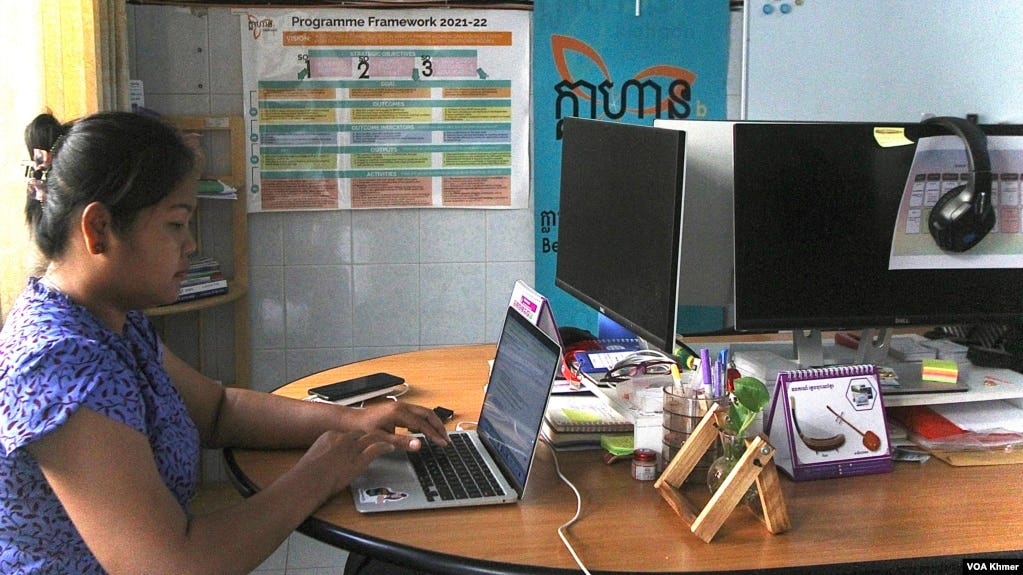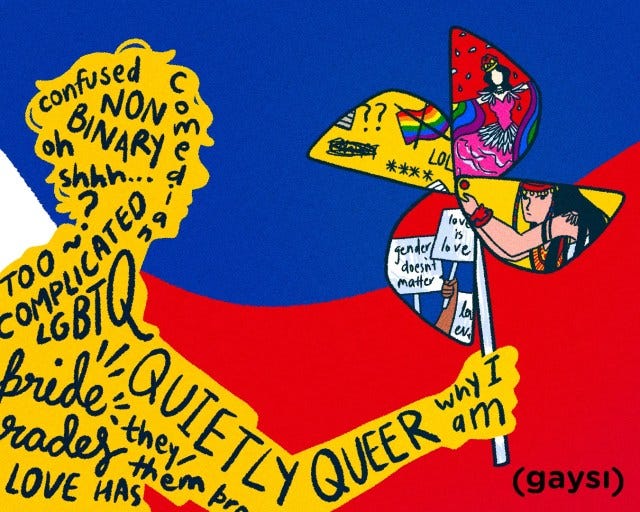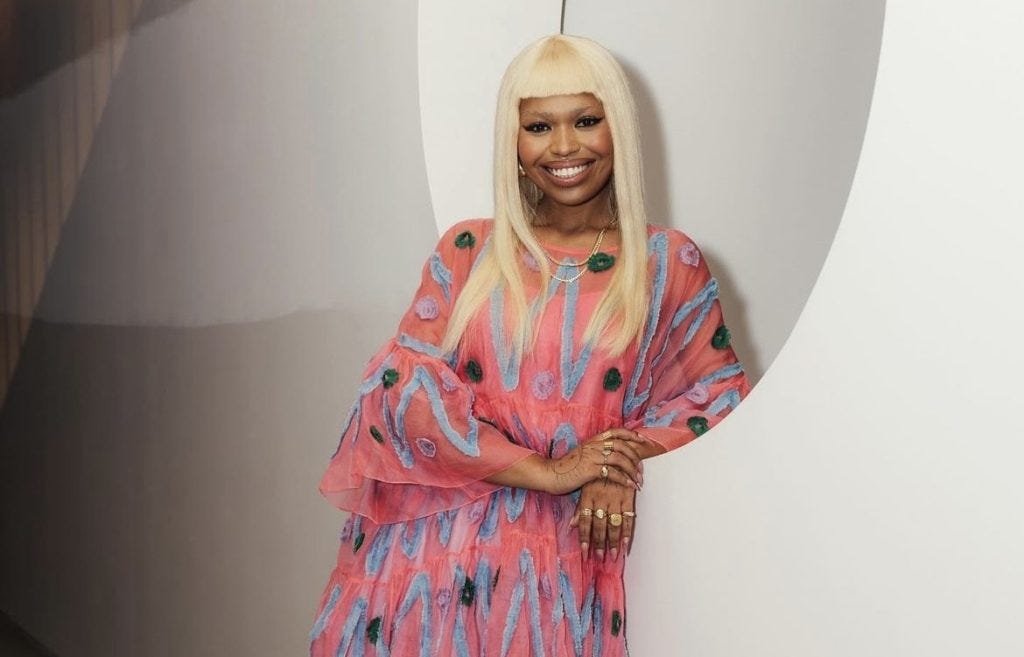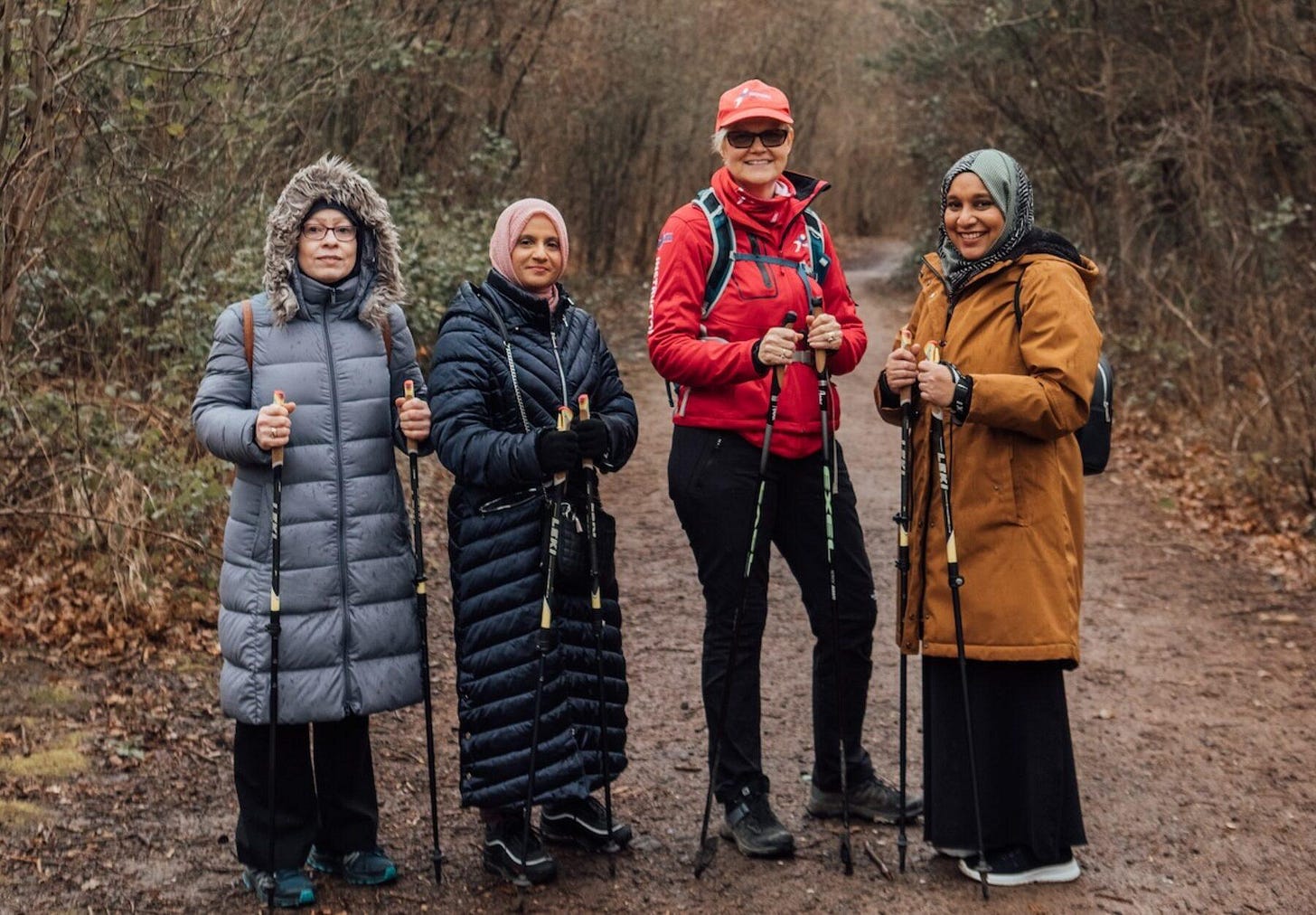Global Roundup: Italy Abortion Rights, Cambodia Divorced Women, Nonbinary Filipino Writer, Vending Machine for Reproductive Health, UK Muslim Women Walking Group
Curated by FG Contributor Samiha Hossain
Italian Prime Minister Giorgia Meloni. Photograph: Drew Angerer/Getty Images
The measure forms part of a package of initiatives approved by Meloni’s cabinet that will be funded by the EU’s post-pandemic recovery fund, of which Italy is the biggest beneficiary, and was put to the lower house in a confidence vote on Tuesday. The package of measures is expected to comfortably pass in the senate, too. The move follows measures already adopted by several rightwing-led regions in funding pressure groups to infiltrate consultation clinics, which provide women with a certificate confirming their wish to end a pregnancy. Some regions, such as Marche, which is led by Meloni’s Brothers of Italy, have also restricted access to the abortion pill.
Abortion was legalised in traditionally Catholic Italy in 1978 under legislation called Law 194. Although Meloni has promised not to change the law, accessing safe abortions in Italy is increasingly difficult due to the high number of gynaecologists who refuse to terminate pregnancies for moral or religious reasons. According to health ministry data from 2021, about 63% of gynaecologists refuse to perform the procedure.
Luisa Rizzitelli, a women’s rights activist and the coordinator in Italy for One Billion Rising, which campaigns to end violence against women, spoke on the severity of the new measure.
This measure might seem like a small thing, but symbolically it is very strong and serious – the government is giving a clear sign in that they want to do everything possible to persuade women to change their minds. This shouldn’t be happening. -Luisa Rizzitelli
Mao Map, Executive Director of Klahaan, an independent organization that campaigns for women’s rights in Cambodia, works in her Phnom Penh office
Women in Cambodia face significant gender disparities after getting divorced. When Thach Chanty, a 35-year-old woman from the southeastern Cambodian province of Kampong Cham recalls life with her former husband, she is nearly brought to tears. Chanty, who works as a garment worker, now struggles to support her two children in the aftermath of a marriage she describes as colored with neglect and violence. Escaping the brutality left her alone in a society that continues to judge divorced women as having failed in their primary social role of wife and mother. Chanty found solace in her family’s support.
I felt sorry for my two sons after I divorced my husband. A lot of people judge me for being divorced, but luckily my parents and sister have been there to support me. -Thach Chanty
A recent report titled Separate Ways, released in late 2023 by the small nonprofit organization Klahaan, sheds light on the struggles faced by Cambodia’s divorced women. Beyond enduring significant social shame and judgment, the report says the divorced women are more likely to face financial and mental issues compared to their former husbands. The report also found emotional abuse affected one-third of women, violence often occurred in the presence of children and few victims sought assistance.
Klahaan Executive Director Mao Map said the new study aims to address the controversial choice of divorce for both women and men. According to Mao Map, the prevailing belief in Cambodia is that women can marry only once in their lifetime — a notion that influences perceptions of divorce. To support women, Mao Map is pushing the government to establish policies that expedite the divorce process, lessening the need for court mediation and increasing protections for women’s health by eliminating victim-blaming by law enforcement.
Sar Sineth, spokesperson for Cambodia’s Ministry of Women’s Affairs, emphasized the government’s commitment to assisting women and girls who have experienced violence, particularly those navigating divorce and coping with post-traumatic stress disorder. She said the ministry coordinates closely with government and the legal system to provide swift support. However, she did not provide details about how women could access those services.
Thach Chanty said she no longer cares about how others judge her for divorcing to escape violence and focus on her sons.
Initially, when I contemplated my divorce, I cried and sometimes even considered ending my life. But now, I have let go of those thoughts and am living my normal life, driven by my desire to do everything for my kids. -Thach Chanty
Nonbinary writer Gab Hernandez wrote on Gaysi about their experience being “quietly queer” in the Philippines. They acknowledged the strides made toward queer acceptance in the country but said they would never go to Pride events.
I simply can’t connect with the type of queer Filipinos who have the confidence to join these parades. At least, that’s what I tell myself. I’m sure there are so many accepting queerfolk in these parades that I’m simply too insecure to talk to…I also have issues with my country’s desire, both queer and straights alike, to paint queerness with one technicolor brush. -Gab Hernandez
Hernandez discussed the history of queerfolk in the Philippines and how gender did not exist in the pre-colonial era. The spread of Christianity and Islam brought along ideals of homophobia and misogyny which persisted even after the country achieved Independence. The 90s, however, saw the rise of several LGBTQ groups that worked towards gaining legitimate political power.
Nowadays, queerfolk still face discrimination from the predominantly conservative Philippines, but they finally have a community that backs them when nobody else can. From notable queer icons in entertainment to senators openly calling for the acceptance of gay marriage, there’s no better time in post-colonial Filipino history to be queer than right now. -Gab Hernandez
Hernandez also talked about how the “flashy rainbow gowns and public declarations of love” do not resonate with them, though they appreciate its significance and power. They find their non-binary identity also difficult to explain as queer and hetero Filipinos still view gender as a strict binary. Hernandez considers themself lucky to have the support of their friends and family.
I wrote this [article] just to let shy queerfolk like me know that there’s nothing wrong about not joining pride parades in the Philippines. Everybody has personal reasons for doing so…After all, pride parades are just one way of celebrating queer identity. It might not be for me, but I’m so happy to live in a country where queer people can express their love so openly. Maybe one day, I’ll join them. -Gab Hernandez
Black queer artist Autumn Breon is using her creativity to fight for a cause she deeply cares about, reproductive justice. Breon is a multi-talented artist in the US who works across many mediums. Breon sees art as a tool to dismantle unfair systems. Her latest project, “The Care Machine,” is a powerful example. Inspired by artists like Octavia Butler and Alice Coltrane, Breon imagines worlds free from oppression.
I model the world I want to live in. That world includes easy access to reproductive health care for all. -Autumn Breon
Teaming up with Plan C and FEMINIST, Breon created resources to empower people. Their “Vote Like An Intersectional Feminist Voting Guide” helps people understand how to vote for candidates who support reproductive rights. But Breon’s most eye-catching creation is the Care Machine. This traveling vending machine, retrofitted with a pink glow, dispenses essential items like lip gloss, books, and pads. Most importantly, it also provides information on how to get abortion pills. Partnering with Plan C, Breon ensures these resources are readily available.
We don’t just talk about popular things. We make what needs to be talked about popular. -Autumn Breon
Breon’s goal is a future where everyone has access to safe abortions, fair pay, and the care they deserve.
Image: Helena Dolby
A group of Muslim women from east London in the UK have found kinship, fitness, spirituality and lots of fun through Nordic walking in the woods. Between two and 12 women from the Muslimah Sports Association (MSA) can show up on any morning. The forest is 18 miles from Shafia Begum’s home in Stratford and it couldn’t look, feel, smell or sound more different. Begum is a mother of three who has experienced anxiety for a long time.
These nature walks have benefited me a lot. They have strengthened my connection with, and gratitude towards, nature and my creator. -Shafia Begum
The Nordic walk sessions became popular after messages were exchanged over social media between Forestry England and MSA. Forestry England is a publicly owned organisation responsible for the country’s 620,000 acres of woodland. MSA is a nationwide charity that started 10 years ago to encourage Muslim women to participate in sports, addressing in one fell swoop mental health challenges, a need for exercise and loneliness.
Salma Quaium is the manager of the MSA’s group in east London. She is a vocal evangelist for Nordic walking – a form of exercise with Finnish roots that uses poles to open up the chest and engage muscles in the upper body as well as in the legs. It was developed by skiers to stay fit in their off season. South Asian people in the UK suffer disproportionately with heart problems and diabetes, and studies have shown levels of activity in south Asian women in particular are low.
A lot of people, especially in our community, are experiencing mental and physical health issues. They come out for reasons like: ‘I need to escape’, ‘I need a little bit of clarity’. They’ve made friends and they’ve bonded. We have tea together at the end, which is really nice. -Salma Quaium
Fears of encountering Islamophobia and racism make it difficult for UK Muslim women to access nature – it can make a forest walk a daunting, or even seemingly impossible, prospect. Knowing that there is a ready-made MSA community awaiting is an instant confidence booster for participants. Quaium tries to encourage women who are too nervous to attend.
Samiha Hossain (she/her) is an aspiring urban planner studying at Toronto Metropolitan University. Throughout the years, she has worked in nonprofits with survivors of sexual violence and youth. Samiha firmly believes in the power of connecting with people and listening to their stories to create solidarity and heal as a community. She loves learning about the diverse forms of feminist resistance around the world.


